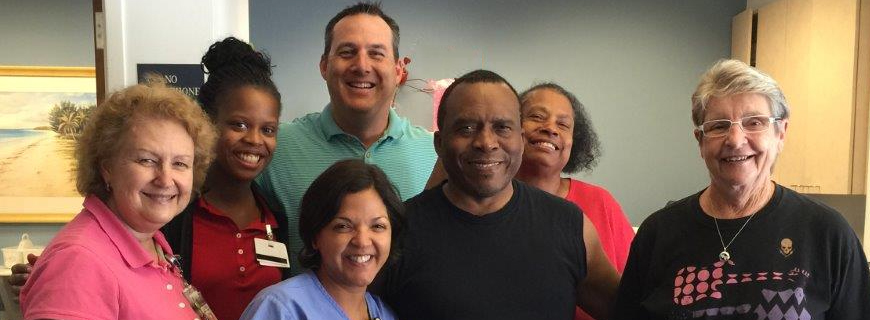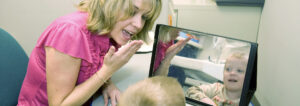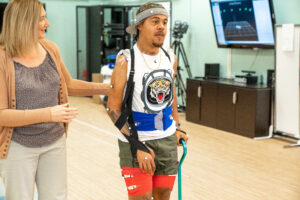Healing from Stroke Through a Song

Back to physical health resource hub
Don and his wife Linda were spending their fifth wedding anniversary in a hospital room. Don had been admitted for adjustments to his heart defibrillator. All of a sudden, he started “losing his words”. Linda’s father had died of a stroke so she recognized the signs immediately and called the nurse.
He was diagnosed as having a transient ischemic attack, or a mini stroke.
Don spent the next 24 hours carefully monitored and medicated. Late that next evening, Linda remembers him becoming very quiet. She asked “Are you tired?” His answer came out garbled. She immediately called for help.
Upon examining Don, his neurologist rushed him into surgery to remove a large clot on the left side of his brain. Physicians considered the surgery successful, but within hours, the bleeding worsened. Don was diagnosed with four simultaneous hemorrhagic strokes on that one day.
If he hadn’t been in the hospital at the time, he would not have survived.
Although Don was in a coma, he was still able to respond to Linda. If she’d ask him a question, he’d squeeze her hand. They were both fans of musician, Danny Gokey, particularly a song entitled, “Hope in Front of Me”.
I’ve been running through rain
That I thought would never end
Trying to make it on faith
In a struggle against the wind
I’ve seen the dark and the broken places
But I know in my soul
Not matter how bad it gets
I’ll be alright”
Linda would play the song for Don and when it would end, she’d ask if he wanted to hear it again. He would squeeze her hand. Two days later, he stopped responding.
A CT scan discovered two more blood clots, this time on the right side. Additional tests revealed the cause; a huge clot had formed in Don’s heart. Smaller clots kept breaking off and traveling to his brain.
Due to the bleeding in Don’s brain and his heart condition, doctors were unable to give him blood thinners. They were quickly running out of hope. Fearing he only had hours left, Linda was told to call in his family to say their last goodbyes.
Don, however, had different plans. He was not quite ready to leave Linda or his family yet. Hour after hour turned into day after day. He was starting to respond once again, which indicated that the bleeding stopped. Each day, he improved a little more.
There’s hope in front of me
There’s a light, I still see it
There’s a hand still holding me
Even when I don’t believe it
I might be down but I’m not dead
There’s better days still up ahead
Even after all I’ve seen
There’s hope in front of me”
Twenty-six days after his strokes, Don was transferred to Brooks in very serious condition. It was Linda’s birthday, but Don was completely unaware of the significance. They spent that afternoon in the healing garden, but Don couldn’t share her birthday cake. He couldn’t walk, talk, swallow or comprehend anything. “He was like a baby. It broke me to see him this way,” said Linda.
One week later, Don stood up for the first time. Therapists had been working with him intensely to help him regain his strength and coordination. He was working with a speech-language pathologist to regain his speaking ability. The stroke had left him with Aphasia. As he underwent his therapy, Linda watched and learned. She was taught how to care for him and help him exercise in the evenings.
“Two weeks later, Don was granted a four hour pass so I took him home. He smiled for the first time as I opened the car windows and played that same Danny Gokey song,” Linda recalls.
That was a turning point.
The next morning, Don told Linda that she was doing a great job. He then asked, “What happened to me? Why I am here? I only remember going to surgery to adjust the defibrillator.”
All during his recovery, Linda kept reminding him who he was before the strokes. She helped him find his determination. She repeated stories about his strength. Twenty-two days later, he was ready to go home.
Don continued his recovery in a day treatment program for people with brain injuries. After several weeks and extensive cognitive therapy, Don was able to hold long, clear conversations. It helped him regain his independence. Don is extremely proud of the fact that he was able to go from a wheelchair, to a walker to walking on his own in less than a year.
The program gave him hope and a sense of belonging. The team there became an extended family to Don and Linda.
There’s a place at the end of the storm
You finally find
Where the hurt and the tears and the pain
All fall behind
You open up your eyes and
Up ahead there’s a big sun shining
Right then and there you realize
You’ll be alright”
Don and Linda are both so grateful for the care they received, they vowed to help others in similar situations. Don became a peer mentor at Brooks. He visits with others who have had a stroke to give them hope and encouragement. Linda visits with him, to let family members know what they might expect throughout the recovery. Don also volunteers once a week in the day treatment program. He is a respected member of the team that once helped him.
On April 28, 2016, Don was asked to throw out the first pitch at a Jacksonville Suns game. With members of both his Brooks Rehabilitation and UF Health Jacksonville care teams there to cheer him on, he was a shining example that life does go on after a stroke.
“I want to express my full gratitude to everybody who participated in my recovery; my loving wife, my family and friends, all of the inpatient and outpatient staff at Brooks and UF Health, church members and the kids who sent me “get well poster cards,” said Don. To them, he dedicates this final verse of his favorite song:
You’re my hope
You’re the light, I still see it
Your hands are holding me
Even when I don’t believe it
I’ve got to believe
I still have hope
You are my hope.”
We are proud to honor Don as one of our 2016 Faces of Stroke for his courageous journey to recovery and the commitment he has towards helping others.


